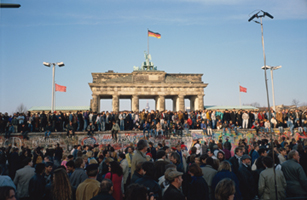
Reunion time As the border fell, people poured through
(2 of 3)
A Glorious Time
The friend who had bid me farewell at checkpoint Charlie joined New Forum. His old schoolmate and Friday-night drinking partner was in the army — and of a senior enough rank, he once let slip, to be tasked with overseeing the burial of the SS20 rocket launchers, trained on the West, in the woods outside Berlin. In this small circle of old friends, the big picture could also be intensely personal. "It could be that one day we'll find ourselves facing each other across the lines," said one friend to the army officer, late one evening. "I won't let that happen," he replied. But there was silence afterward.
Yet for all the unease, it was a glorious time to be in the East. Demonstrators in Leipzig held up posters saying SEND THE STASI TO THE FACTORIES. Signs reading CLOSED FOR TECHNICAL REASONS appeared in shops when too many staff had left the country to run the businesses. (One sign near my flat was changed more candidly to read CLOSED FOR HUNGARIAN REASONS.) The evening news, usually a numbing ritual of party-processed, statistical information and announcements of ministerial meetings, became unmissable. Spontaneous gatherings in kitchens and courtyards echoed a new mood of openness: politics ruled by day, parties by night. There was only one topic of conversation: "What happens next?"
In this mood of anxious exhilaration, journalists gathered at the International Press Centre, a Stasi-infected building close to the Wall that had become the center of our daily routine. Theoretically, press from the "nonsocialist economic areas" (the West) had minders who were supposed to keep an eye on us. Really though, there was nothing they could do as we raced around interviewing dissidents like Rainer Eppelman, the "turbulent priest" from the Samaritans Church, and Bärbel Bohley, the feisty doyenne of the opposition who had the distinction of being thrown out by the regime and then bringing a legal case to come back. All the minders could insist on was the odd lunch, presumably to keep up a flow of information about our views of the situation. Even the informers had lost the will to spy.
Between 1 and 1.5 million adult East Germans had applied to leave the country, no longer fearing recrimination. So at the evening press conference of Nov. 9, as Günter Schabowski, the broad-shouldered Berlin party chief, took the chair, the exodus and its impact — especially on the hospitals and emergency services — loomed over all other considerations. Schabowski was one of the few remotely sympathetic characters of the old Politburo. He'd been a journalist on the party mouthpiece Neues Deutschland and fancied himself as good at cut and thrust with Western reporters. He also had a touch of the city's famous uppity attitude and its thick accent, which added a certain comedy to the proceedings.
It was a hot room and I was at the back, taking notes when, shortly before 7 p.m., an Italian reporter asked about the new travel law. Schabowski announced that the Politburo would henceforth permit East Germans to leave the G.D.R. on application. Visas would be issued "without delay." Peter Brinkmann, from the anti-communist West German Bild Zeitung, asked whether this would apply to West Berlin, and when the new law would come into effect. "Ab sofort" (Immediately), said Schabowski, flicking through his notes in search of validation. "It's a matter for the council of ministers," whispered the minister next to him. Too late.
The British correspondent Daniel Johnson was up next and sounded puzzled. "What will happen to the Wall now?" Schabowski looked stricken: "The permeability of the Wall from our side does not yet and exclusively resolve the question of the meaning of the fortified state border of the G.D.R.,'' he replied. So there we had it — a wall open, but still closed. Lewis Carroll would have been proud.
No one knew what to do with this tangled logic, least of all Schabowski, who hurriedly called the meeting to a close. At the end, he promised "fair and free elections." That would have been sensational news the day before, but we weren't even interested in it. Unthinkables were tumbling by the minute. All that needed to follow were the bricks in that damn wall. An almighty rush to the scant number of telephones followed, so I decided to run to the nearest border-crossing point at Checkpoint Charlie before the Times' evening deadline. The only other journalist with the same idea was Brinkmann, who was intent on finding cheering East Germans. People were either too busy trying to digest Schabowski's gnomic utterances, or hadn't yet seen the news.